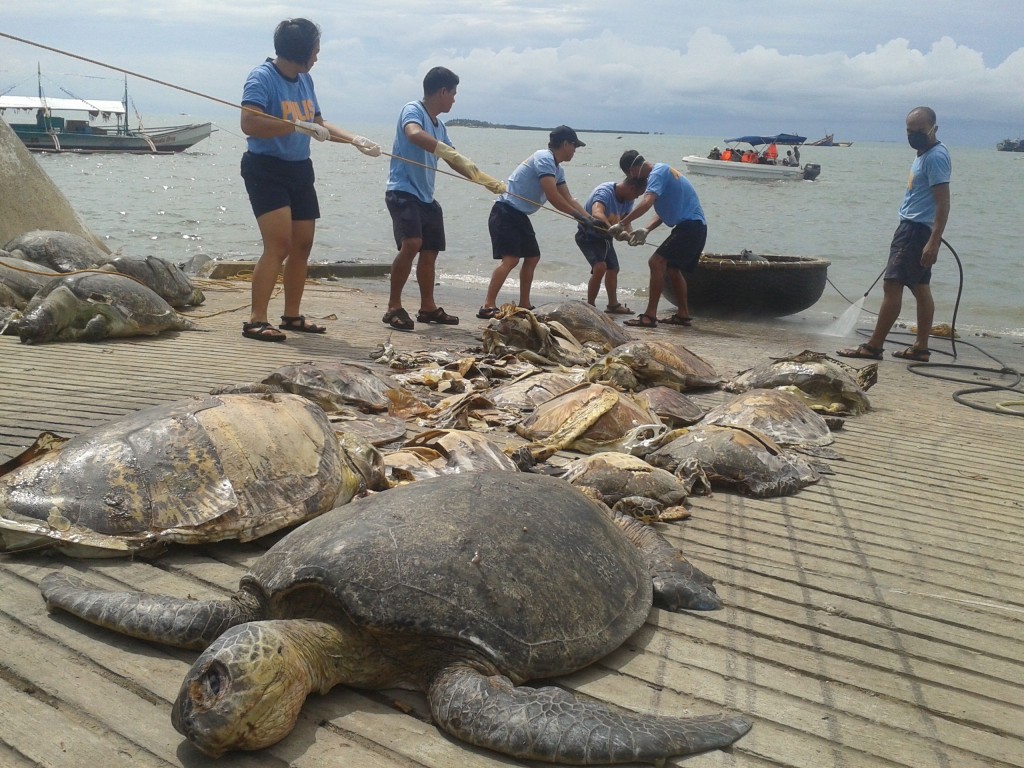
PNP Maritime police hauling dead sea turtles off the Chinese fishing vessel caught in the disputed Hasa Hasa Shoal.INQUIRER PHOTO/REDEMPTO D. ANDA/INQUIRER SOUTHERN LUZON
WASHINGTON, DC—The Philippines will now be able to more effectively combat trafficking and other crimes against wildlife with the signing of a bilateral agreement with the United States, the Philippine Embassy said today.
The agreement was between the Department of Environment and Natural Resources (DENR) and the Department of Agriculture’s Bureau of Fisheries and Aquatic Resources (DA-BFAR) and the US Fish and Wildlife Service.
It will provide the Philippines with access to and use of the US National Wildlife Forensics Laboratory in Oregon, considered to be the only laboratory in the world that is dedicated to crimes against wildlife, according to Ambassador Jose L. Cuisia, Jr.
“With this agreement, our law enforcement authorities in the Philippines can be expected to more effectively prosecute wildlife traffickers and other offenders,” Cuisia said in welcoming the signing of the Memorandum of Understanding.
Cuisia said the agreement will give more teeth to the ongoing efforts to curb wildlife trafficking in the Philippines because the results of the tests of wildlife samples and biota submitted to the forensics lab will be considered admissible evidence in Philippine courts.
The Memorandum of Understanding was signed by Director Dan Ashe of the US Fish and Wildlife Service, DENR Undersecretary Analiza Teh and the DA-BFAR Director Asis Perez.
“The fight to prevent wildlife trafficking and halt its devastating impact on some of the world’s most well-known and well-loved wild animals is going to take a global effort,” said Ashe.
The collaboration is the latest in the Partnership for Biodiversity II program, a joint program of the US Agency for International Development (USAID) and the Department of the Interior, under which the latter provides assistance on environmental law enforcement to Philippine law enforcement agencies.
According to Ashe, access to the US National Wildlife Forensics Laboratory will help police and prosecutors build stronger cases against wildlife traffickers. “This is good news for native wildlife and for dozens of species from across the globe that may be smuggled into or through the Philippines,” Ashe explained.
The laboratory is one of only a handful of labs of its kind in the world and is a global leader in developing techniques for examining, identifying and comparing physical evidence of crimes against wildlife using a wide range of scientific procedures and instruments.
The lab supports law enforcement efforts not only in the US, but also in the 179 other countries, including the Philippines, that have signed the United Nation’s Convention on International Trade in Endangered Species.
The agreement will also serve as the foundation for expanded cooperative anti-trafficking initiatives between Philippine and United States law enforcement agencies in coming years.
It also supports the US Government’s wildlife anti-trafficking and biodiversity conservation goals as outlined in President Barack Obama’s Executive Order on Combating Wildlife Trafficking.
It also strengthens the important and strategic partnership among USAID, the US Department of the Interior, the Fish and Wildlife Service and the Philippine Government in combating environmental crime.
RELATED STORIES
Philippines nabs 11 Chinese poachers
DENR clamps down on wildlife trafficking
US backs Asean in wildlife preservation

